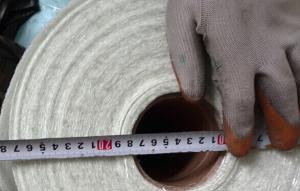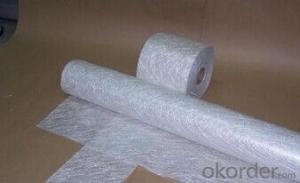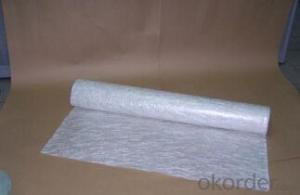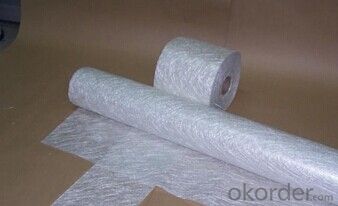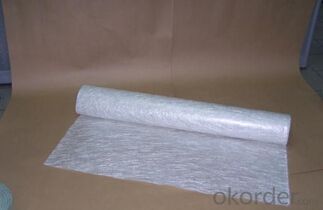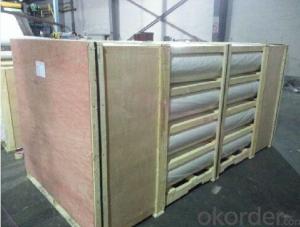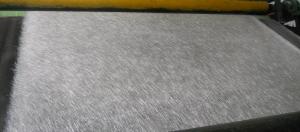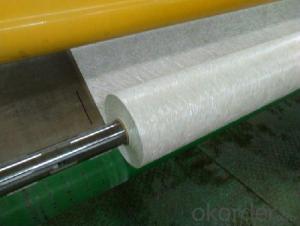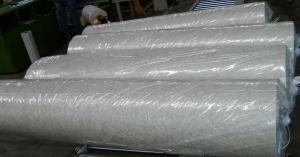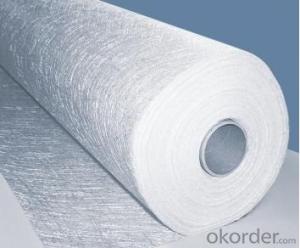Fiberglass Mat Tissue - E-Glass Chopped Strand Mat Emission, 1000mm
OKorder Service Pledge
OKorder Financial Service
You Might Also Like
Product Description:
Chopped strand mat is made from fiberglass chopped strands boned with powder binder or emulsion binder.
E glass chopped strand mat is made from fiberglass strands chopped to length and bonded together
with powder binder.
Application:
Chopped strand mat is used primarily for hand lay-up processes, filament winding and press molding of FRP products. Typical products include bathroom accessories, pipe, building materials, automobiles, furniture and other FRP products.
Images:
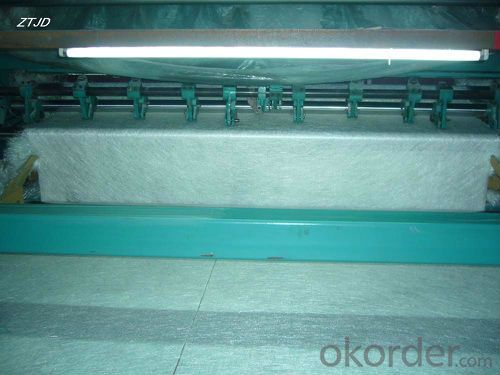
Features of E-glass Chopped Strand Mat
1.Warp and weft rovings aligned in a parallel,flat manner and uniform tension .
2.Densely alighed fibers,providing high dimensional stability ans easy handing .
3.Good moldability,fast and complete resin wet-out ,enabling high productively .
4.Good transporsision and hign strength of the composite products.
5.Even thickness ,no fuzz ,no stain.
6.Fast wet-out ,products with high strength ,little loss for strength in damp situation.
7.fiberglass woven roving has the features of : high tensile strength, corrosion resistance, flame retardance,insulativity.main function
8.applied to hand lay-up process
9.to reinforce UP resin
10.even thickness and flawless
11.good performance of processability in moulded parts
12.properties guaranteed under moisture condition
13.excellent mechanical strength during production of finished products
Specifications:
| Item Code | (G/M2) | Width(M) | Tensile Strength (N/150mm) | LOI(%) | moisture content% | Compatible Resin |
| EMC225 | 225 | 0.5~3.3 | ≥80 | 2~8 | ≤0.20 | UP,VE,EP,PF |
| EMC300 | 300 | 0.5~3.3 | ≥130 | |||
| EMC450 | 450 | 0.5~3.3 | ≥150 | |||
| EMC600 | 600 | 0.5~3.3 | ≥170 | |||
| EMC900 | 900 | 0.5~3.3 | ≥180 |
Packaging:
Each Chopped Strand Mat is wound onto a paper tube which has an inside diameter of 76mm and the mat roll has a diameter of 275mm. The mat roll is wrapped up with plastic film,and then packed in a cardboard box or wrapped up with kraft paper. The rolls can be vertically or horizontally placed. For transportation, the rolls can be loaded into a container directly or on pallets.
Storage:
Unless otherwise specified, Chopped Strand Mat should be stored in a dry, cool and rain-proof area. It is recommended that the room temperature and humidity should be always maintained at 15℃~35℃ and 35%~65% respectively.
- Q: What are the different fabric finishes available for fiberglass mat tissue?
- Fiberglass mat tissue offers several fabric finishes, each with its own unique properties and characteristics. Let's explore some of the most common finishes available: 1. Polyester: Widely used in fiberglass mat tissue, polyester fabric finishes provide excellent strength and durability. This finish improves tear resistance and tensile strength. 2. Polypropylene: Known for its high resistance to chemicals and moisture, polypropylene fabric finishes enhance water resistance properties. Ideal for applications where moisture or chemical exposure is a concern. 3. Acrylic: Acrylic fabric finishes offer good heat resistance and flame retardancy. They improve the material's thermal stability and fire resistance, making it suitable for high-temperature or fire-prone environments. 4. Nylon: Renowned for its excellent abrasion resistance and toughness, nylon fabric finishes enhance durability and wear resistance. Perfect for applications involving frequent contact or friction. 5. Polyethylene: With outstanding resistance to moisture and chemicals, polyethylene fabric finishes improve water repellency and chemical resistance. Ideal for outdoor or corrosive environments. 6. Polyurethane: Polyurethane fabric finishes provide flexibility and elasticity to fiberglass mat tissue. They enhance the material's ability to withstand bending and stretching without breaking or tearing. When selecting a fabric finish for fiberglass mat tissue, it's essential to consider specific application requirements. Factors such as strength, durability, water resistance, flame retardancy, abrasion resistance, and chemical resistance should all be taken into account to choose the appropriate finish.
- Q: Can fiberglass mat tissue be used for making fiberglass molds?
- Yes, fiberglass mat tissue can be used for making fiberglass molds. It is often used as a reinforcement layer to provide strength and stability to the mold, allowing it to withstand the pressures and forces exerted during the molding process.
- Q: Can fiberglass mat tissue be used for waterproofing?
- Indeed, fiberglass mat tissue has the potential to be utilized for waterproofing purposes. This particular material, comprised of fiberglass fibers, takes the form of a thin, non-woven substance. Its primary function lies in the reinforcement and provision of waterproofing attributes within the realm of construction and building applications. When combined with a waterproofing agent or resin, the fiberglass mat tissue can establish an impermeable barrier, effectively impeding the infiltration of water or moisture. Consequently, it proves to be a highly advantageous option for various undertakings such as roofing, basement waterproofing, and the installation of bathrooms or showers. Furthermore, the robustness and enduring nature of fiberglass mat tissue contribute to its resistance against cracks or tears, guaranteeing the longevity of its waterproofing capabilities.
- Q: Can fiberglass mat tissue be used for mold-making?
- No, fiberglass mat tissue is not typically used for mold-making.
- Q: Can fiberglass mat tissue be used for making lightweight ceilings?
- Yes, fiberglass mat tissue can be used for making lightweight ceilings. It is a strong and lightweight material that is commonly used in construction for its fire resistance, durability, and insulation properties. It can be easily molded and shaped to create lightweight ceiling panels, making it an ideal choice for applications where weight reduction is desired.
- Q: Is fiberglass mat tissue suitable for chemical storage tanks?
- Yes, fiberglass mat tissue is suitable for chemical storage tanks. It is highly resistant to corrosion caused by various chemicals and provides excellent strength and durability to withstand the harsh conditions of chemical storage. Additionally, it helps in preventing leakage and ensures the long-term integrity of the tanks.
- Q: Can fiberglass mat tissue be used for making surfboards?
- Yes, fiberglass mat tissue can be used for making surfboards. Fiberglass mat tissue is a lightweight and strong material that is commonly used in the construction of surfboards. It is typically layered with epoxy resin to create a durable and rigid surface. The fiberglass mat tissue provides strength and flexibility to the surfboard, allowing it to withstand the pressures and forces experienced while riding waves. Additionally, the smooth and sleek surface of the fiberglass mat tissue helps to enhance the performance and speed of the surfboard. Overall, fiberglass mat tissue is a popular choice for surfboard construction due to its excellent strength-to-weight ratio and ability to create high-performance boards.
- Q: Can fiberglass mat tissue be used for insulation in research laboratories?
- Yes, fiberglass mat tissue can be used for insulation in research laboratories. It is a common material choice due to its excellent thermal insulation properties and fire resistance. Additionally, fiberglass mat tissue is lightweight, durable, and easy to install, making it suitable for various insulation applications in laboratories.
- Q: How does fiberglass mat tissue contribute to the strength and durability of composite materials?
- The strength and durability of composite materials are greatly enhanced by fiberglass mat tissue. To begin with, the mat tissue acts as a reinforcement element, providing added strength and rigidity to the composite structure. The fibers in the mat tissue are usually made of glass, which possesses high tensile strength and stiffness. These fibers are arranged randomly, forming a three-dimensional network that evenly distributes stress throughout the composite material. This network of fibers helps to resist cracks and fractures, thus increasing the overall strength of the composite. Additionally, the mat tissue serves as a protective barrier against delamination, a common problem in composite materials. Delamination refers to the separation of layers within the composite, which can weaken its structural integrity. By bonding the layers together and improving their adhesion, the fiberglass mat tissue prevents delamination. This enhanced adhesion reduces the chances of interface failure and improves the overall durability of the composite material. Moreover, fiberglass mat tissue contributes to the improved impact resistance of composite materials. The random fiber orientation within the mat tissue creates a crisscross pattern that enhances the composite's ability to absorb and distribute impact energy. This characteristic makes the material less susceptible to damage from external forces, such as impacts, vibrations, or mechanical stress. In conclusion, fiberglass mat tissue plays a vital role in strengthening and enhancing the durability of composite materials. Its reinforcement capabilities, delamination prevention, and improved impact resistance make it an essential component in various industries, including automotive, aerospace, construction, and marine, where the demand for strong and durable materials is critical.
- Q: Is fiberglass mat tissue suitable for insulation in pharmaceutical plants?
- Insulation in pharmaceutical plants cannot be accomplished with fiberglass mat tissue, as it does not meet the necessary criteria. The insulation materials used in pharmaceutical plants must fulfill specific requirements, including being non-porous, non-shedding, and resistant to moisture and chemicals. Unfortunately, fiberglass mat tissue is a porous substance that can shed fibers, posing a risk of contamination to the pharmaceutical production environment. Moreover, it may not offer sufficient protection against moisture and chemicals, both of which are prevalent in pharmaceutical plants. To ensure compliance with the required standards and regulations for insulation in these delicate environments, it is advisable to utilize insulation materials that are explicitly designed and certified for pharmaceutical applications.
Send your message to us
Fiberglass Mat Tissue - E-Glass Chopped Strand Mat Emission, 1000mm
OKorder Service Pledge
OKorder Financial Service
Similar products
Hot products
Hot Searches
Related keywords
